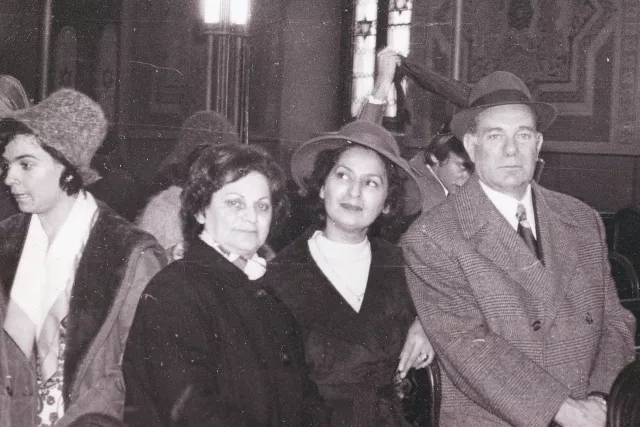Arnold Leinweber in the Choral Temple
This was at the marriage of Liviu Leinweber, my nephew, at the Coral Temple in Bucharest, in 1973. From right to left: me, Arnold Leinweber, Florica Vintila (daughter of my first degree cousin, Frima Vintila), and Julieta Sabetay (first degree cousin from my mother's side of the family).
Liviu Leinweber is the son of my middle brother, Moritz Leinweber. He had two children: Liviu and Marius. They are both in Israel now. Liviu became an agricultural engineer and Marius became a technician in the same field. Liviu lives in Haifa and has a daughter. Marius lives in Tel Aviv and has a daughter too. Moritz died of colon cancer in 1992.
My mother's eldest sister, Matilda Pascal [nee Froim], had four children: Blima, Frima, Itic, and Julieta. Matilda died of tuberculosis. She caught it during the war [World War I], while attending the wounded and the sick. She was buried on 25th July 1923, in Bucharest, at the Filantropia Jewish cemetery. [My uncle] remarried, and then he died, so his second wife inherited his sewing machine, his whole fortune, three wardrobes full of dowry for the girls. Florica Vintila., the daughter of Frima Vintila [nee Pascal], my first degree cousin. Julieta Sabetay [nee Pascal], was taken by an uncle of mine, George Gherman, to a orphanage of the Jewish Community, opposite the Hala Traian. She stayed there until she got married to a lad from Craiova, Sabetay, whose brother was the president of the Jewish Community in Craiova for a long time.
I, Arnold Leinweber, was born in Bucharest on 12th August 1920. My parents never missed the synagogue on holidays, but weren't so religious as to go there every day. I personally don't have a favorite holiday. To me, the Jewish holidays are historical holidays, holidays of joy, celebrations of certain events related to agriculture and to the ancient life of the Jews - there's nothing religious about them, in fact. The fact that, on Yom Kippur, people pray to God for forgiveness of their sins and for reconciliation between men who did wrong to one another, is a purely human thing. I was never a religious man. After my bar mitzvah - I did my duty, like any Jewish child -, the everyday work and my job prevented my contact with the Hebrew letters. When my father took me to the synagogue on Rosh Hashanah or Yom Kippur, he put the tallit on my shoulder and had me read from the siddur, but I couldn't get it right - I read either too slowly or too fast, and he never knew where I was. This annoyed me, because it made me feel stupid, and made me forget everything I ever read. Even if I go to the synagogue only on festive occasions, this doesn't mean I don't feel like a good Jew. I go to the temple [the Coral Temple], because there are no synagogues left in my neighborhood. There used to be scores of them in the past. Each street had its synagogue, and each guild had its synagogue - the carpenters, the shoemakers, the tinsmiths, and all the others. The members of each trade had the ambition to have their own synagogue, which was a very good thing.





























